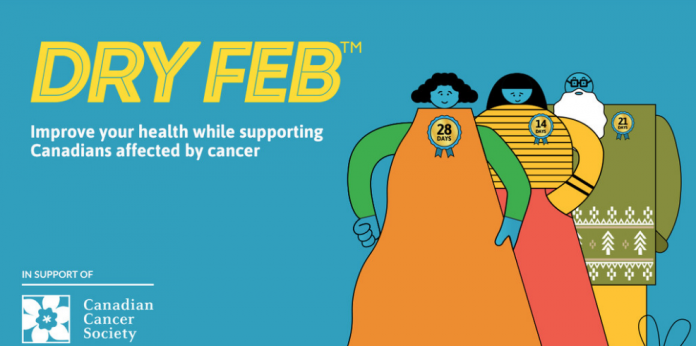The Canadian Cancer Society (CCS) is calling on all Canadians to “go dry” this February. Kicking off on February 1, the eighth annual Dry Feb campaign is a national fundraiser that challenges Canadians to go alcohol-free for the month of February while getting healthy and raising funds for an important cause.
“With the recent release of the new Canada’s Guidance on Alcohol and Health, it’s important to raise awareness that alcohol consumption puts you at risk for at least 9 different types of cancer,” said Andrea Seale, Chief Executive Officer, Canadian Cancer Society. “That’s why we’re inviting all Canadians to go alcohol-free this February. It’s a great opportunity to kickstart a healthier lifestyle, challenge yourself, and have fun while helping people affected by cancer.”
Released yesterday by the Canadian Centre on Substance Use and Addiction (CCSA), Canada’s Guidance on Alcohol and Health outlines the health risks of alcohol and can help people make an informed decision on whether they drink and how much. CCS recommends that to reduce your cancer risk, it’s best not to drink alcohol at all. If you choose to drink, you can keep your cancer risk as low as possible by having no more than 2 standard drinks a week. A standard drink varies by type and volume of alcohol but is typically: 1.5 oz of spirits, 5 oz of wine or 12 oz of beer. The less alcohol you drink, the lower your cancer risk.
A recent survey commissioned by CCS reveals that 42% of Canadians who consume alcohol are drinking more than 2 drinks a week. And while the survey shows that Canadians who consume alcohol want to live healthier, with respondents saying improved physical health and feeling energized is important to them (84% and 82%, respectively), we also know that 2 of out 10 Canadians drink alcohol daily and over 40% of Canadians are not aware that alcohol consumption increases the risk of cancer.
It is known that regular alcohol consumption over time, even at low levels, increases cancer risk. Yet, in 2015, an estimated 3,300 new cancer cases diagnosed in Canada were due to alcohol consumption. If the trend continues, the number of new cancer cases due to drinking alcohol will triple to 10,100 in 2042. Despite this, the survey uncovered additional trends in alcohol consumption habits of Canadians who consume alcohol, including:
- 36% say knowing the link between alcohol consumption and cancer risk makes them want to re-examine their relationship with alcohol.
- 48% say they generally feel better when they are consuming less alcohol.
- 41% say new guidance would help them make informed choices about drinking alcohol.
While taking one month off alcohol will not significantly impact a person’s risk of developing cancer, Dry Feb provides an opportunity for participants to re-evaluate their relationship with alcohol. In fact, after completing 2022’s Dry Feb, about three-quarters of surveyed participants said they would drink less in the future. Participants have also reported personal health benefits, such as sleeping better, increased energy levels and an overall improved general sense of well-being.
Since 2016, the annual campaign has raised over $10 million to fund world-leading cancer research, lead change in the most pressing areas of healthy public policy and provide compassionate support for Canadians affected by and living with cancer. Last year, the campaign raised $3.8 million. This year, CCS hopes to raise even more.
Every day and every dollar will make a meaningful difference in the lives of people affected by cancer. Go dry this Feb and feel the benefits. Register or donate today at DryFeb.ca.








